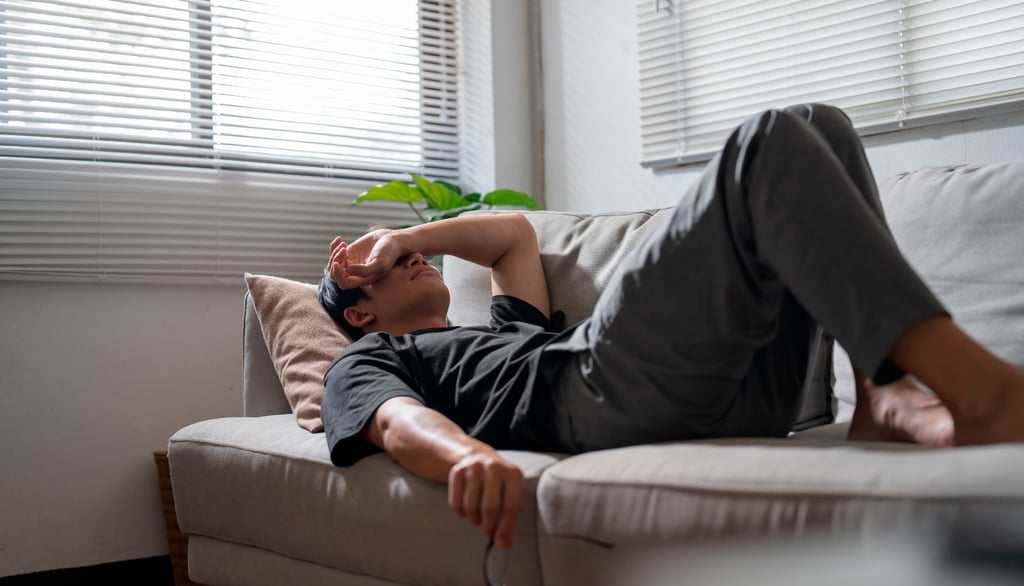Anxiety. The complete guide to overcoming the disease of the century and restoring your inner peace
Discover how to deal with anxiety, the so-called “disease of the century.” This complete guide offers practical strategies to manage your mind, emotions, and find inner peace.
9/29/20256 min read


Has anxiety taken over your life? Find out why it’s called the “disease of the century” and learn effective strategies to manage your mind and emotions, transforming your reality and finding the calm you deserve.
Anxiety doesn’t have to be your “new normal.”
If you identify with this article and want to take the first step toward a more balanced life, click here and discover how therapy can be your greatest ally on this journey of self-discovery and healing.
The silent epidemic: why has anxiety become the disease of the century?
We live in the age of information, instant connectivity, and high expectations. Our inboxes and social media feeds never stop, and the feeling that we must always be “on” and productive has become the rule.
This fast-paced, pressure-filled reality comes at a cost: our mental health. Anxiety has stopped being a passing feeling of worry and has become a silent epidemic — the “disease of the century” that affects millions of people around the world.
Brazil, in particular, leads the global ranking of countries with the highest number of people suffering from anxiety disorders. But what does that mean in practice? It means living in a constant state of alert, with body and mind always ready for a threat that, most of the time, doesn’t even exist. Pathological anxiety is like a fire alarm that goes off for no reason, turning ordinary concerns into a rollercoaster of fears and insecurities.
This article aims to demystify anxiety — helping you understand its roots, recognize its signs, and most importantly, providing reliable, practical tools so you can regain control of your life. You’ll discover that it’s possible to manage your thoughts and emotions, restoring the calm and inner peace that once felt lost.
Recognizing the signs: what anxiety does to your body and mind
Before anything else, it’s essential to know how to identify anxiety. It doesn’t manifest only as mental worry — its symptoms can be physical, emotional, and behavioral.
Physical symptoms:
Increased Heart Rate: Feeling like your heart is “pounding out of your chest.”
Shortness of Breath: Tightness or pressure in the chest.
Muscle Tension: Especially in shoulders, neck, and jaw.
Excessive Sweating: Sweaty palms and hot flashes.
Digestive Problems: Stomach pain, nausea, or diarrhea.
Headaches and Dizziness: A sensation of “lightheadedness.”
Sleep Issues: Trouble falling asleep or unrefreshing rest.
Mental and emotional symptoms:
Excessive, Uncontrollable Worry: The mind constantly creating negative scenarios.
Difficulty Concentrating: Attention easily drifts away.
Irritability and Restlessness: Feeling the need to always be doing something.
Constant Fear: The sense that something bad is about to happen.
Loss of Control: Fear of “going crazy” or passing out.
If you’ve recognized some of these symptoms in your daily life, don’t panic — recognition is the first step toward change. Anxiety can be managed and overcome. It’s a process, and you don’t have to go through it alone.
Understanding the root: what causes anxiety?
Understanding the causes of anxiety is like uncovering the roots of a tree — only then can you truly care for it. Anxiety’s origins are multifactorial and vary from person to person.
Genetic and biological factors:
Genetic predisposition can make someone more vulnerable to developing anxiety. Additionally, chemical imbalances in the brain — such as low serotonin levels — can influence mood regulation.
Environmental and social factors:
Our fast-paced lifestyle is one of the biggest triggers. The pressure to succeed, information overload, fear of social judgment, and even economic instability all contribute to generalized anxiety.
Trauma and life experiences:
Traumatic events such as loss, accidents, or abuse can leave deep emotional and physical scars, leading to anxiety disorders.
Lifestyle habits:
Excessive consumption of caffeine, alcohol, or stimulants, poor diet, and lack of sleep or exercise can all fuel anxiety.
Thought and behavioral patterns:
The well-known “Accelerated Thought Syndrome,” popularized by Brazilian psychiatrist Augusto Cury, describes a mind that can’t stop — constantly producing thoughts and imaginary scenarios. This cycle of negative, catastrophic thinking feeds anxiety and can make it chronic.
If you feel that racing thoughts are taking over your life, there is a way out. Managing anxiety begins with self-awareness. How about taking the first step today and exploring your emotions more deeply?
Regaining control: practical tools to manage your mind and emotions
The good news is that anxiety is not a life sentence. With the right tools and lifestyle adjustments, you can significantly reduce symptoms and regain control.
1. The power of conscious breathing
In moments of crisis, the first thing affected is your breathing. It becomes shallow and fast. Calming your breath sends an instant “relax” signal to the brain.
Diaphragmatic (Abdominal) Breathing Technique:
Sit or lie down comfortably.
Place one hand on your chest and the other on your abdomen.
Inhale deeply through your nose for 4 counts, feeling your belly rise.
Hold for 2 seconds.
Exhale slowly through your mouth for 6 counts.
Repeat 5–10 times daily — even when you’re not anxious.
2. The power of mindfulness and presence
Anxiety lives in the future - in fears of what might happen. Mindfulness is the antidote that brings you back to the present.
Observation Exercise:
Choose any object — a cup, a flower, your hand — and observe it closely for one minute. Notice every detail: color, texture, shape, and weight. Each time your mind wanders, gently bring it back to observation.
This trains your mind to focus and quiets mental noise.
3. Rewriting negative thought patterns
Cognitive Behavioral Therapy (CBT) teaches that the way we think directly impacts how we feel. To overcome anxiety, we must challenge automatic negative thoughts.
Ask Yourself:
Is this thought really true? What’s the evidence?
Am I viewing the situation realistically or exaggerating?
What’s the worst that could happen? And the best?
What would I tell a friend who had this same thought?
Then reframe it: Instead of “I’ll fail this presentation,” say “I’ll do my best to prepare, and even if it doesn’t go perfectly, I can learn from it.”
4. The importance of routine and self-care
Caring for your body helps calm your mind. Your daily habits have a powerful effect on mental health.
Physical Exercise: A 30-minute walk, yoga, or any enjoyable activity releases endorphins — hormones that promote relaxation and happiness.
Sleep Hygiene: Create a bedtime routine. Avoid screens, drink chamomile tea, or read before bed. Quality sleep is essential for managing anxiety.
Healthy Diet & Hydration: Avoid excessive caffeine and processed foods. Eat foods rich in tryptophan — like bananas, eggs, and nuts — to boost serotonin. Drink plenty of water.
Quality Time: Make time for hobbies, nature, and rest. Disconnecting is as important as being connected.
Self-care may seem simple, but consistency makes all the difference. Remember — self-care is self-love. Want to learn more about small daily habits that can transform your life? Click here!
The journey continues: professional help Is your greatest ally
Self-management tools are powerful, but when anxiety becomes overwhelming, professional help is essential.
Therapy — especially CBT — is proven effective in treating anxiety. A psychologist or psychiatrist can guide you, helping to identify triggers, process trauma, and create personalized strategies for your life.
Dealing with anxiety is a journey of self-discovery, patience, and courage. Don’t be too hard on yourself — celebrate small victories. With each deep breath and each challenged thought, you reclaim a piece of your inner peace.
You don’t have to fight alone.
If anxiety is affecting your quality of life, now is the time to seek help. Click here to schedule a session with a mental health professional and begin your healing journey. Your mind and your future will thank you.
How sports help heal anxiety
Science has proven that physical activity is a natural antidote to anxiety. It works on both body and mind, creating a positive cycle that helps break stress and worry patterns.
How exercise fights anxiety
Release of “Feel-Good” Neurotransmitters: Exercise increases serotonin, dopamine, and endorphins — chemicals that enhance mood, reduce pain, and create relaxation.
Reduced Cortisol Levels: Physical activity lowers the stress hormone cortisol, calming the nervous system.
Mindfulness in Motion: Sports demand focus on breathing and movement, helping you stay present — a form of active meditation.
Improved Sleep: Regular exercise regulates sleep cycles, reducing insomnia.
Higher Self-Esteem: Reaching small fitness goals boosts confidence and creates a sense of accomplishment.
Best sports for anxiety relief
The best activity is the one that brings you joy — consistency matters more than intensity. Some of the most effective include:
Walking or Running: Simple, accessible, and meditative.
Yoga and Pilates: Strengthen the mind-body connection and promote relaxation.
Swimming: The water’s calm environment soothes the senses.
Team Sports: Soccer, volleyball, or basketball foster social interaction and belonging.
Martial Arts: Channel tension and energy productively, while developing focus and discipline.
Remember — sports are powerful allies but not a substitute for therapy. They should complement professional treatment for anxiety.
Health
Tips for a healthy and balanced life.
© 2025. All rights reserved.
Well-being
Privacy Policy
Terms and conditions
